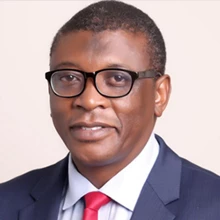WEST AFRICAN INSTITUTE FOR FINANCIAL AND ECONOMIC MANAGEMENT (WAIFEM)
AT THE OPENING CEREMONY OF THE REGIONAL COURSE ON CYBER SECURITY AND DIGITAL/CYRPTO CURRENCIES,
FREETOWN, SIERRA LEONE, MAY 20-24, 2024
The Hon. Governor, Bank of Sierra Leone, Dr. Ibrahim L. Stevens,
Directors of the Bank of Sierra Leone here present,
Esteem Resource Persons from Bank of Ghana and Deloitte and Touché,
Distinguished Course Participants, Gentlemen of the Press,
Ladies and Gentlemen.
INTRODUCTION
1.0 Introduction
It gives me great pleasure to extend a warm welcome to the Hon. Governor, facilitators, and participants on behalf of the West African Institute for Financial and Economic Management’s (WAIFEM) regional course on Cybersecurity and Digital/Cryptocurrencies in Freetown, Sierra Leone’s historic capital city. I hope you all had a pleasant trip, especially the course participants and facilitators who have travelled from far and near to be here with us today.
From the outset, I would like to express our sincere appreciation to the President, His Excellency Dr Julius Maada Bio, President of the Republic of Sierra Leone, Government and the people of Sierra Leone, for permitting us to organize this course in this lovely city.
Our special gratitude goes to Hon. Governor, Bank of Sierra Leone, Dr. Ibrahim L. Stevens, management and staff of the Bank of Sierra Leone for the warm reception and hospitality accorded us on arrival and the excellent facilities placed at our disposal for the organization of the course. For us at WAIFEM, Sierra Leone has become a home away from home
For the sake of emphasis, let me again thank Governor Stevens for his steadfast support and constant encouragement in realising WAIFEM’s mission, vision, and mandate. His dedication to collaboration and partnership inspires us all and has driven our zeal to be the centre of excellence for capacity building in West Africa.
I would also like to take this opportunity to extend our heartfelt appreciation to all the participants and their nominating institutions. Your presence here today underscores your commitment to professional development and your institutions’ recognition of the significance of enhancing their staff’s skills and expertise in our collective endeavor to harness the benefits of digital innovations while mitigating the risks they pose to our economies and the cybersecurity landscapes.
Hon Governor, Ladies and Gentlemen,
As we navigate the complexities of the digital space, West Africa stands at a critical Juncture. The adoption of digital and cryptocurrencies in our region offers tremendous opportunities for economic growth, enhanced financial inclusion, and streamlined transactions. Yet, these advancements also bring forth substantial challenges and vulnerabilities that we must address, particularly in the realms of cybersecurity.
At this year’s World Economic Forum in Davos, one pressing issue that was brought to the forefront of global discussions is Artificial Intelligence (AI) and cybersecurity. They were identified as the second-biggest challenge facing the global economy today and the nearest future. This recognition is not just a reflection of the current state of our interconnected digital world but also a clear call for action by all relevant stakeholders involved.
Yet, digital currencies have the potential to transform our financial infrastructure, making it more robust, efficient and inclusive. For a region with a high rate of unbanked individuals, the implications of digital financial solutions could be transformative, offering easier access to banking services and reducing transaction costs. Moreover, as digital currencies gain traction, they could significantly enhance cross-border trade and economic integration within the ECOWAS region.
2.0 Risks and Challenges:
However, these opportunities are not without their associated risks. The digital landscape is fraught with security threats, ranging from cyber fraud and scams, financing terrorism to more sophisticated cyberattacks that could threaten national and regional financial stability as well as national and regional stability. Additionally, the regulatory frameworks within West Africa are still in developmental stages, which face challenges in creating a harmonized approach to managing and securing digital currencies.
3.0 Objectives of the Course
This course is designed to empower the participants from various sectors across West Africa, with the knowledge and skills necessary to tackle these emerging challenges. Through a series of expert-led sessions, we will explore the foundational aspects of cybersecurity as they relate to the innovative sphere of Central Bank digital currencies and the broader context of cryptocurrencies.
We will address the critical need for robust legal and regulatory frameworks, explore the role of cybersecurity in protecting digital infrastructures and discuss how to build resilience against cyber threats.
4.0 On WAIFEM
Before concluding this welcome remarks, I would like to warmly welcome those encountering WAIFEM for the first time. I am pleased to introduce you to our Institute, which has been at the forefront of capacity-building efforts in our region for over two and a half decades.
Accordingly, I encourage you to explore WAIFEM’s rich history and accomplishments by visiting our website at www.waifem-cbp.org. Here, you will discover the breadth of our capacity-building work, spanning institutional reforms, collaborative partnerships and a network of reputable international organisations. Established on July 22, 1996, by the central banks of The Gambia, Ghana, Liberia, Nigeria, and Sierra Leone, WAIFEM’s primary mandate is to cultivate a cadre of skilled professionals in macroeconomic and financial management. This is achieved through targeted training programs designed for central banks, core economic ministries and other pivotal public and private sector institutions shaping economic policy.
Over the years, WAIFEM has earned its reputation as a premier capacity-building Institution within our subregion and on the global stage. With a track record of delivering 936 capacity-building programmes to 26,148 participants from across the subregion and beyond, WAIFEM has left an indelible mark on the economic governance and policymaking landscape.
Under the guidance of the WAIFEM Board of Governors, the Institute has continually evolved to meet the changing needs of our member nations.
In recent years, we have expanded our portfolio to include cutting-edge and specialised training in governance, regional integration, financial technolog Artificial Intelligence, cybersecurity, climate change, and youth unemployment, among others.
WAIFEM has also built collaborative arrangements with a number of reputable Institutions to ensure high standards and quality of its programmes. These institutions include among others; the Institute for Capacity Development (ICD) and Statistics Department of the International Monetary Fund (IMF), the World Bank and African Development Bank (ADB) Institutes, the United Nations Institute for Training and Research (UNITAR), Debt Relief International (DRI), the Commonwealth Secretariat, African Capacity Building Foundation (ACBF), and United Nations Economic Commission for Africa (UNECA).
Mr, Chairman, these collaborative technical partners find in WAIFEM an effective and efficient platform to reach many more West Africans, while the Institute in turn shares with them the sources of cutting-edge knowledge, skills and support with which to enrich our programmes.
WAIFEM remains committed to fostering excellence in economic management and policymaking as we look to the future. We stand ready to continue our journey of empowerment, equipping public officials with the knowledge, skills and expertise needed to navigate the complexities of our ever-changing global economic landscape.
5.0 Conclusion.
Before I conclude, I would like to call on the participants to embrace this opportunity to learn from each other and to strengthen their networks.













